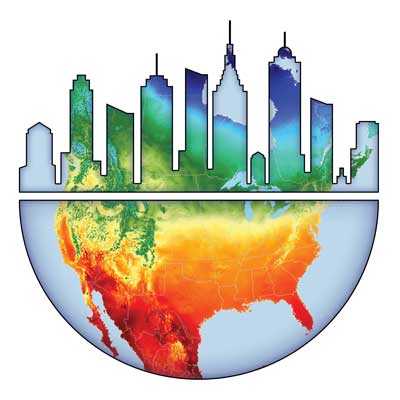DOE Announces Fourth Urban Integrated Field Laboratory
November 2022
Arizona State University–led industry-academic partnership involving University of Arizona, Northern Arizona University, two national laboratories, and IBM aims to advance urban climate research and develop solutions for Arizona’s most heat-vulnerable.
Yesterday the U. S. Department of Energy (DOE) announced the award of the Southwest Urban Corridor Integrated Field Laboratory (SW-IFL) led by Arizona State University. The award of $25 million over five years is to develop new understandings of the interacting stresses of extreme heat, atmospheric pollutants, and limited water supply on vulnerable communities across Arizona.
Earlier this year, DOE announced the funding of three other UIFLs in three different urban regions facing various environmental and climate hazards with distinct and diverse disadvantaged populations. Each selected UIFL includes significant participation from local and minority-serving institutions and will provide new opportunities at these institutions to inspire, train, and support leading scientists who have an appreciation for the global climate and energy challenges of the 21st century. UIFLs will serve as an important element of DOE Office of Science’s commitment to the Justice40 Initiative, which prioritizes investment in diverse and underrepresented communities affected by a changing climate.
Existing UIFL projects include:
- Community Research on Climate and Urban Science Urban Integrated Field Laboratory (CROCUS UIFL; Chicago), led by Argonne National Laboratory, will employ a network of observations and modeling from street to regional scales to explore multiple issues, including mitigation via green roofs and blue spaces, and community-driven future scenarios for adaptation and decarbonization.
- Southeast Texas Urban Integrated Field Laboratory (SETx UIFL), led by the University of Texas at Austin in Beaumont/Port Arthur, Texas, focuses on specific challenges of industrialized, midsized port cities, including significant legacies of petrochemical industry, and how climate change may affect urban flooding and air quality.
-
Baltimore Social-Environmental Collaborative Urban Integrated Field Laboratory (BSEC UIFL), led by Johns Hopkins University, focuses on a metropolitan area facing interlinked challenges of aging infrastructure, increased heat and flood risk, and inequitable burdens of air and water pollution that are common to many other midsized industrial cities in the Eastern and Midwestern United States.
UIFLs will expand the understanding of climate and weather events and their impact on urban systems, including diverse demographic characteristics; differing climate-induced pressures on people and infrastructures; and varied geographic settings. Understanding how climate change will impact urban systems and infrastructure is key to building resilient cities powered by clean energy, helping achieve President Biden’s goal of a net-zero carbon economy by 2050.
Each UIFL project team brings together scientific expertise from multiple institutions with a breadth of expertise in field observations, data assimilation, modeling, and model-data fusion to study the environmental, ecological, infrastructural, and human components of their selected urban regions. The selected projects will advance our scientific understanding of urban systems and harness that understanding to inform equitable climate and energy solutions, strengthening community-scale resilience in urban landscapes, and addressing climate change impacts on underrepresented and disadvantaged communities.
The newest Southwest Urban Corridor Integrated Field Laboratory (SW-IFL) seeks to engage Arizona communities reaching from the border with Mexico to the Navajo Nation and provide scientists and decision-makers with high-quality, relevant knowledge capable of spurring and guiding responses to extreme environmental concerns–specifically to develop new understandings of the interacting stresses of extreme heat, atmospheric pollutants, and limited water supply on vulnerable communities across Arizona.
“We seek to understand, not only the factors that influence these complex relationships but the disproportionate impacts on vulnerable urban subpopulations,” said David Sailor, Principal Investigator on the project and Director of ASU’s School of Geographical Sciences and Urban Planning. “Our goal is to use innovations in high-resolution modeling and observations to inform the development and deployment of policies and solutions that are effective, equitable, and generalizable.”
The SW-IFL is a partnership between all three major public universities in Arizona, two national laboratories, and industry, each bringing unique skills, capabilities, and local stakeholder relationships in underserved communities to the project. Arizona State University leads the team that includes the University of Arizona, Northern Arizona University, Oak Ridge National Laboratory, Brookhaven National Laboratory, and IBM.
The integrated field laboratory will include more than a dozen researchers across the three academic institutions and will combine high-resolution atmospheric, land surface, and infrastructure data with advanced computer modeling and community engagement to create new knowledge and develop regionally specific predictive tools that will be translatable to other arid regions.
Critical to the laboratory’s efforts is making sure historically underserved and disadvantaged communities that live in urban environments are represented. Field research will be conducted across the state using an array of atmospheric measurement instruments and a robust stakeholder network for the project, which already includes six city governments, multiple county-level agencies, community groups, and local nonprofits throughout the state.
All UIFL projects were selected by competitive peer review under the DOE Funding Opportunity Announcement for Urban Integrated Field Laboratories.
